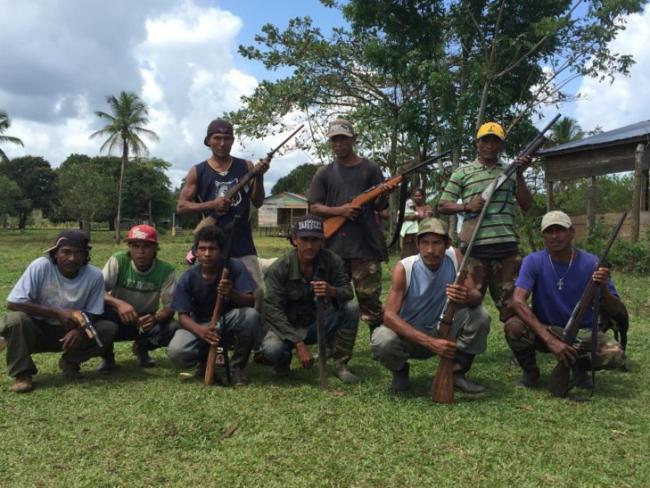
Dr. Wolfgang Minatti
@wolfgangMinatti
“Self-legitimation bears special relevance for many rebel groups, which are marked by a contentious environment, with members often involuntarily or quasi-voluntarily joining.”
Armed groups govern civilians because it helps them to foster popular support. However, there might also be other reasons: Governing allows rebel members to believe themselves legitimate. Studying the nexus between rebel governance and self-legitimation can thus provide insights into the justificatory narratives prevalent among rebel groups. Peacebuilders on the ground should take into consideration such narratives to avoid contestation and dissidence of rebel groups on the path to peace.
For decades, armed groups in Colombia, from leftist rebels to right-wing paramilitaries, have been providing governance to civilians in areas of limited state capacity to solidify their own control and present themselves as a capable alternative to the state. For example, by the early 2000s, the leftist rebel group Fuerzas Armadas Revolucionarias de Colombia (FARC) was present in more than 40 percent of all municipalities in Colombia, making rebel governance a widespread phenomenon across the country.
Most commonly, these patterns of governance are explained as a means for armed groups to gain support for their struggle among the civilian population, be it in the form for sustenance, recruits, intelligence, or shelter. But is this utilitarian strategy all there is to rebel governance?
Earlier articles published on the Civil War Paths blog have drawn attention to the internal dynamics of rebel groups, particularly their effects on civilians. They have investigated how rebels’ political education programmes shape conflict-related sexual violence in Sierra Leone; how in Nepal inter-combatant practices such as inter-caste marriage influenced wider societal transformations; or how perceptions of deprivation contributed to rebel mobilisation in Congo.
While these pieces have shed light on how internal dynamics of armed groups shape their relations with civilians, this blog focus on the rebels’ own combatants instead. It conceptualises armed groups’ wartime governance as a means of self-legitimation, explaining the forms and patterns of rebel governance beyond utilitarian movements. Drawing on my doctoral fieldwork with FARC ex-combatants in Colombia, I build conceptual and practical bridges by showing how my understanding of rebel governance as self-legitimation may feed into practitioners’ peacebuilding efforts.
The importance of Rebel Self-Legitimation
Like monarchs, states and organisations, many rebel groups develop sophisticated constellations of rituals, narratives, and practices that help to legitimise the group and justify its claim to power and role as governor vis-à-vis civilians and other armed actors. In other words, rebel groups wish to act and look like states.
However, such practices and narratives are aimed not only at out-groups but also at the in-group, as individuals in positions of power generally want to justify being part of the ruling group. The process of self-legitimation emphasises this need for members to establish narratives or practices through which they justify their position of power within their group.
Self-legitimation bears special relevance for many rebel groups, which are marked by a contentious environment, with members often involuntarily or quasi-voluntarily joining. In my research, I argue that governance, understood as the implementation of the rebel group’s political project so as to achieve their ideal society, can be seen as such a practice of self-legitimation through which rebel members come to think of their position of power as righteous.
The Self-Legitimation of the FARC
During my fieldwork in Colombia between August 2021 and January 2022, I had various conversations with FARC ex-combatants active in the group’s so-called Eastern bloc about their war experiences. Governance practices repeatedly emerged as a means for them to legitimise their own position of power and membership during the conflict.
For one, their governance practices allowed combatants to frame themselves as providers of order within controlled territories. “People stole and killed in the countryside,” one former guerrillero told me, “but when the guerrilla law came, it was all over!”[1] In turn, the violence and coercion that civilians confronted as part of FARC governance were seen as necessary measures by FARC rebel members in light of state inaction to address social problems such as land distribution and other inequalities. “We were born out of necessity,” one ex-combatant emphasised.[2] This idea of providing order and the necessity of violence thus allowed combatants to think of themselves as rightful rulers in that they were directly helping those communities who lacked any other pathway to improvement.
Moreover, FARC members understood their governance to follow Marxist ideology, allowing them to justify their right to rule because they perceived themselves as having the necessary epistemic authority to identify problems within Colombia and provide solutions to them through their governance. “We knew the needs that the peasants suffered,” one former combatant noted, “and we based our work for the people on these pillars [of Marxism].”[3]
Peacebuilding and Rebel Self-Legitimation
As highlighted above, rebel governance may not always be strategic but follow internal logics as well. In turn, this logic of self-legitimation has implications for practitioners of peacebuilding.
Given the centrality of justificatory narratives around governance for combatants’ self-legitimation, rebel groups are likely to try to adhere to these narratives both during and after conflict. The deeply contested decision of the FARC to retain their name in their transition into a political party reinforces this point.
In turn, considering rebel self-legitimation is important, not least in Colombia where President Gustavo Pedro’s agenda of paz total needs not only to find deals with rebel leaders, but also to ensure that any agreement aligns with rebel members’ self-image to avoid contestation, dissidence and a potential splintering in the face of peace. The FARC dissidents, who took up arms again in 2019, are a case in point, having become disillusioned with what they perceived as a peace process failing on one of the central justificatory narratives of the decades-old rebel group: transformational change.
Thus, a consideration of the justificatory narratives surrounding rebel governance should inform negotiations with rebel groups, as peace agreements will likely only be sustainable where they accommodate rebel self-legitimation in a meaningful way.
[1] Interview with FARC03, Tolima, 28 Sept 2021
[2] Interview with FARC10, Tolima, 01 Oct 2021
[3] Interview with FARC05, Tolima, 29 Sept 2021

